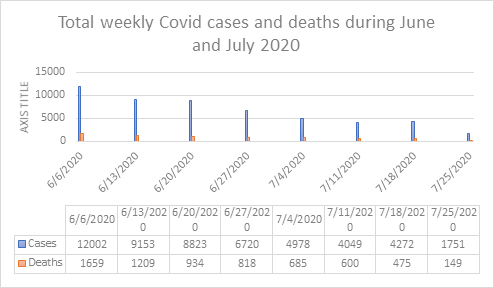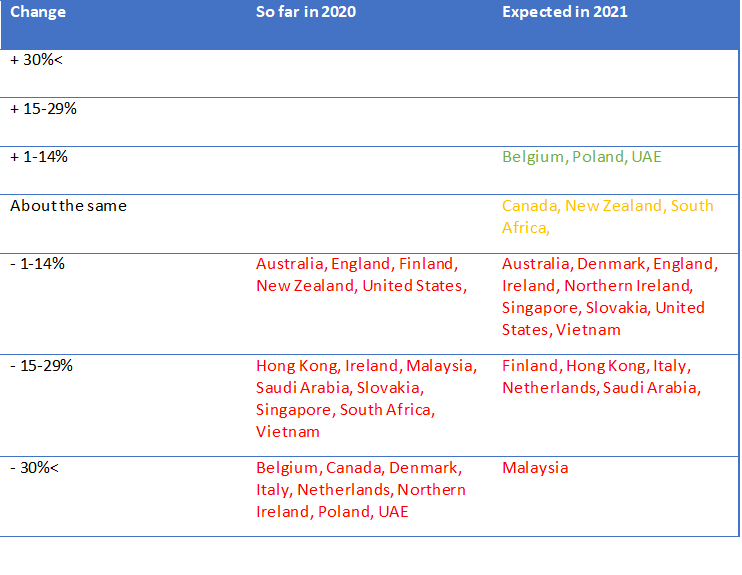This is the eighteenth of a series of bulletins produced by ISE to update members on key data and policy on Covid-19. This bulletin focuses on the period 16/07/2020-22/07/2020.
You can access all of the Covid-19 bulletins on the ISE website.
Latest Covid-19 data

Data taken from Wikipedia and from the government’s Number of coronavirus (Covid-19) cases and risk in the UK webpage. This week we are reporting the weekly number of cases and deaths as this shows a clear and steady decline in the extent of the disease over the last two months. The data for the week 19-25th July is still incomplete.
- The UK currently has reported a total of 2916,377 cases and 45,501 deaths.
- The R number (which describes the rate of transmission of the diseases) has been creeping up, but there is more to monitoring the disease than watching the R number.
- There is excitement about the possibility of a Covid vaccine following publication of new research in Oxford.
Ending lockdown
- Despite the formal ending of the lockdown, English people have been slow to embrace their new found freedoms, leading to reduced takings in pubs and restaurants.
- The shifting of responsibility for lockdown to local authorities has resulting in some wrangles over access to data between central and local government.
- The local lockdown in Leicester has continued. Anneliese Dodds from the Labour Party argues that financial aid is needed for these local lockdowns.
Politics and policy
- Debate over the Chancellor’s Plan for Jobs continues, with some commentators arguing that it will be difficult to judge its success. Others have noted that much of the funding in the Plan had already been announced.
- There will be an inquiry in to the UK governments handling of the Covid crisis.
Schools
- Labour are calling for increased support for childcare and early years provision.
- Ofqual have published more detail about how they will moderate schools ‘optimistic’ grade assessments.
- The government has announced an increase in schools funding.
- Teachers will get a pay rise of 3.1% from September, but there are concerns about what this will do to school budgets.
- Further details have emerged about how the government’s catch up funding for schools will work.
- Claudia Harris stands down as CEO of the Careers & Enterprise Company.
Further and higher education
- Analysis of apprenticeship statistics finds that apprenticeship starts are down by 47% compared to last year.
- PWC Chairman Kevin Ellis argues that the government needs a new agenda on skills.
- There are concerns about student mental health following the lockdown alongside wider concerns about the pandemics impact on mental health.
- Universities look set to be hard hit by a decline in the number of Chinese students.
- Higher education careers services have been upskilling during the Covid crisis.
Economy
- New ONS data published on the UK labour market. The ending of the lockdown is starting to unfreeze the labour market, but the big test will come when the furlough scheme ends.
- The Office for Budgetary Responsibility predicts that unemployment will reach 12% and the British Chamber of Commerce argues that a third of companies will cut jobs.
- British Airways has retired its 747 fleet partially in responses to the challenges that the airline industry is facing. However, some commentators argue that the airline industry will bounce back quickly.
- The housing market is enjoying a mini-boom following the end of lockdown.
The student labour market
- School leavers are facing an uncertain future as they try and enter the labour market.
The international graduate labour market
ISE and INEUCS have published new research on the international graduate labour market during the Covid crisis. Tristram Hooley has written a blog summarising key findings, but a brief summary can be found in the figure below. The report received some coverage in the press including this piece in FE News.

Employer insights
The following insights are based on ISE’s interactions with employers during the period covered by this briefing.
- Plan for Jobs. There is some concern about how to responding to the Plan for Jobs. Most firms are still trying to decide what to do. Generally, they are not sure that the money is enough to drive employer behaviour. Mainly people will continue to do what they were going to do anyway. Some reported an interest in the Kickstart scheme, but firms will need to spend time developing a quality recruitment process for this route.
- Wider impacts of Covid. A lot of firms are spending a money on converting business to be Covid safe. Some firms are also managing restructures and redundancy. This has an implication for early careers.
- Virtual careers fairs. These seem to have been working well so far. A key decision for firms is between targeted university virtual fairs, larger national ones and company specific ones.


0 Comments